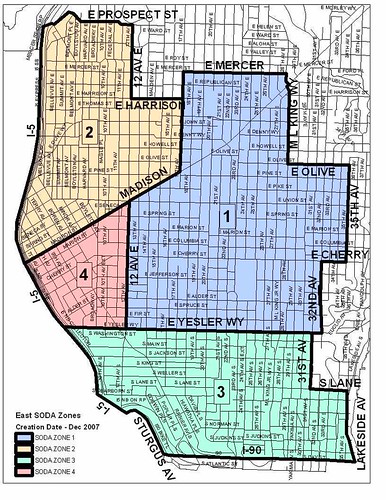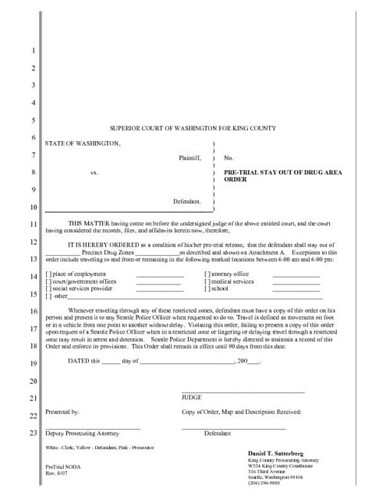
(see the MPNA version of this post:
http://millerparkseattle.blogspot.com/2008/04/stay-out-of-drug-area-soda-program-your.html
for a detailed Q & A with Ellen about some issues raised here).
Dear Community Members,
For over a year the Seattle Police Department and the King County Prosecutor’s Office have been working together to implement a Stay Out of Drug Area (SODA) program for defendants charged with narcotics trafficking crimes.
As a part of that effort, the Seattle Police precinct commanders have identified geographic locations in their precincts as high narcotics trafficking areas . These areas were identified as such based upon citizen and business complaints, crime statistics and police observations.
King County deputy prosecutors will soon be asking Superior Court judges to order defendants arrested in these SODA zones to stay out of these zones as a condition of their pre-trial release. This order will also authorize the Seattle Police Department to contact and/or arrest defendants who violate the court’s order. (A copy of this order is attached for your review. The East District SODA map, shown above, will become readable if you click on it)
At this point, we need to convince the court that the program is worth the effort and necessary to the public safety. Since the effort to implement this program was driven in large part by residents and businesses it may be helpful for judges to learn what it is like to live and work in areas near open air drug markets and how the issuance of SODA orders might be useful in reducing these problems.
Mark Larson, Chief Criminal Deputy Prosecuting Attorney, will soon be meeting with King County Presiding Superior Court Judge Bruce Hilyer to explain the reasons for the SODA program. If you would like for Mr. Larson to include your comments in his meeting with Judge Hilyer, then please address a letter to the judge and send it to me by April 21, 2008.
Please do not hesitate to contact me if you have any questions.
Sincerely,
Ellen O’Neill-Stephens
[email protected]
Senior Deputy Prosecuting Attorney
Office of the King County Prosecuting Attorney
King County Courthouse
516 3rd Ave. W554
Seattle, WA. 98104


This idea makes sense at a broad level. If there’s a specific area that is a major gathering place for specific criminal activities, and if someone is convicted of criminal activity at that area, asking them to stay away from that area is a reasonable way to help prevent the same thing from happening again.
However, the SODA areas that are outlined in this map are huge. If someone is nabbed at 23rd and Yesler, they aren’t allowed to visit the businesses on the northeast end of Madison? That seems excessive. What happens if that person lives or works in the neighborhood where they are nabbed? Are they forced to quit their job or move houses? That’s not going to help someone get back on their feet.
Has this idea been implemented in other places? Are there reports of its effectiveness that could be evaluated?
Could somebody clarify what is meant by “Pre-Trial” in this case? I know this seems kind of obvious, but if it’s pre-trial, then the subject of this order potentially hasn’t been convicted of a crime yet, or am I misunderstanding “pre” in this case? I guess my concern is that you’re placing restriction on a person for the accusation of a crime, which, I’m pretty sure, isn’t exactly how the American criminal justice system is supposed to work, unless there’s risk of flight. I’m all for restricting drug activity, but how can you justify this in a legal sense?
Take the classic “slipper-slope” argument: if I’m accused of speeding in my car, should I not be allowed on I-5, since it’s a high-speeding area? Clearly alot of cars go over the speed limit on I-5, endangering the public, right?
I see drug activity all the time on my block, but I’m not sure an end-run on the criminal justice process is the right answer to the problem. Good luck with it though, I’m sure the ACLU is going to have a field day with this one ;)
You’re talking about defendants charged but not convicted of crimes. With this SODA plan, The prosecuting attny can charge any drug violator with trafficking and effectively ban that person from their family, home, school, support system, etc.
I appreciate your frustration with the legal system, but this seems like a bad idea.
I’m with the slippery slope group here. I empathize with the intent and the frustrations in our neighborhoods, but until someone is convicted of a crime I don’t think this is a workable or even a legal approach. However, some similar idea could work for those who have been convicted and who are either leaving prison or rehab as part of a probation plan. Good for both the community and the individual. Returning to the old or similar environment is seldom good for the addict. Therefore, it follows then that retuning does the community no favors.
Joanna
The Pre-Trial SODA order makes exceptions to the restriction for places of employment, court/government offices, social services provider, attorney office, medical services, and school between the hours of 6:00 am and 6:00 pm.
If an individual lives in a SODA zone then the order is usually not imposed.
The request is made only for the SODA zone that the person was arrested in, not all the zones in a precinct.
The order is for a 90 day period from the date that a defendant is arraigned for the offense. Most cases are adjudicated by that time.
Pre-Trial SODA orders have been issued in other cities in the United States.
Superior Court Judges often place pre-trial restrictions on charged defendants if the restriction is related to the charged crime.
I live close to 23rd/Union, so yes, I’ve seen plenty of drug-related activity. Having said that, and being plenty frustrated with the people doing it, is this really the best way to try to solve the problem?
The other question – given the lack of police resources in the East Precinct, how easy is it going to be to actually enforce this?
Has this idea been implemented in other places? Are there reports of its effectiveness that could be evaluated?
Thank you for the important work you do, Ms. O’Neill-Stephens. I wonder if you know how much we appreciate your efforts.
If Superior Court Judges place pre-trial restrictions already, why do we need SODAs?
I sent Ms. O’Neill-Stephens some questions about the program. Andrew Taylor added her response to the MPNA post.
See also: coverage at Seattle Crime Blog